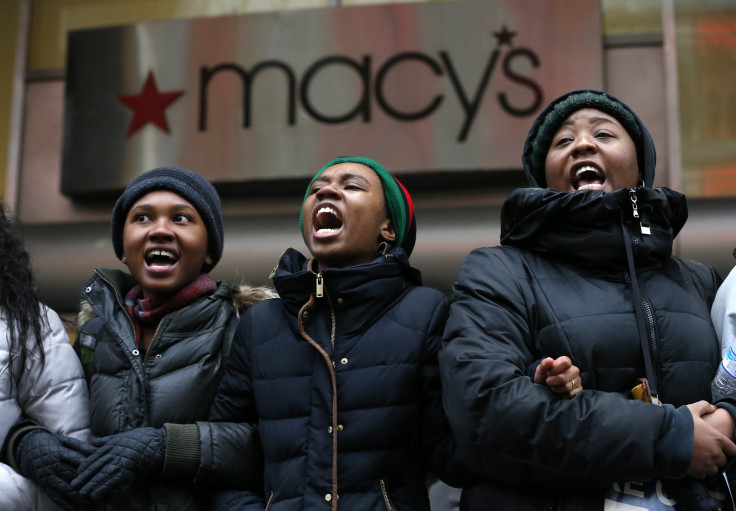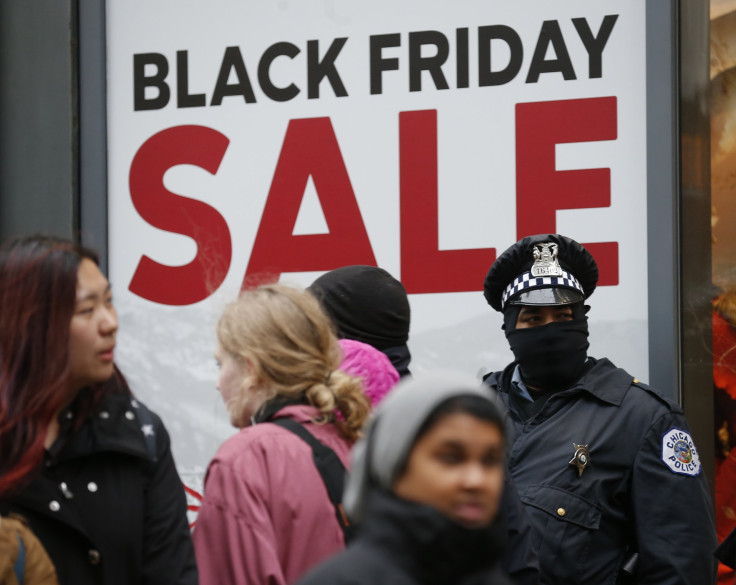National Blackout 2015: Can Black Twitter Shut Down Holiday Shopping Season?

Yaa Asante Waa, a black community activist in New York City, stood in the heart of Harlem over the weekend to see how many African-American shoppers would remain true to their social media pledges to shop less or not at all during Black Friday promotions. He and others observed people with “tiny bags” instead of large totes leaving the stores that line the historic 125th Street shopping district, a sight they hoped would translate to fewer revenues on Cyber Monday and greater political influence for blacks across the nation.
Asante Waa, along with other African-American social justice activists, called for the boycott of retailers ahead of new protests against incidents of police lethal force in Chicago and Minneapolis. The so-called “National Blackout,” a campaign to get black shoppers to stay home from malls this holiday shopping season and redirect their collective billions of dollars inward, is, among other things, an effort to remove black dollars from tax revenues that might otherwise fund local police departments, Asante Waa said.
“It’s just wrong that you can kill, murder, maim and throw us to the ground and say we have no power to change it,” he said in a phone interview Monday. “It’s important that we redirect our power. It’s time for change, and I think that’s in the air.”

But even as African-Americans are increasingly seen as an important consumer base year-round and make up a disproportionate segment of Christmastime bargain shoppers, some retail industry experts said they doubted any sustained protests among black shoppers could significantly hurt apparel, toy and electronic retailers this season. Instead, they said a better approach would be for activists to build relationships with retailers to create powerful alliances that could spur social change.
“I think it’s not going to work,” Andy Jassin, a fashion industry retailing consultant in New York City, said of the National Blackout holiday shopping protest. “Americans are so addicted to value shopping that it’s a temporal moment. … It is window dressing for [an issue] that should be dealt with at all times of the year.”
Jassin, managing director for the Jassin Consulting Group, said people aligned with a wide range of social causes have staged unsuccessful boycotts in the past to gain attention. But few have gone a different route, he said, by approaching retailers for help on raising awareness on issues, including race and criminal justice. For example, Black Lives Matter protesters could ask big chains such as Macy's or Target to demand new policing reforms to curb police brutality, Jassin said.
“The retailer serves a diverse and wide-ranging community of consumers,” Jassin said. “The best thing is to work within that group of retailers to make a change.” A blanket boycott also “could be hurting a number of people the inner-city community who are working part time in those stores,” he added.
In Chicago, following the release of video that showed a white policeman shooting a black teenager 16 times, thousands of protesters, mostly black, lined the city’s Magnificent Mile shopping district on Michigan Avenue last week in protest. Many demonstrators blocked entrances to Macy’s, Zara and Old Navy to discourage shoppers from spending their money, prompting significant police response at intersections along the shopping district. Activists said they action was meant to call attention to the 2014 killing of Laquan McDonald and how Chicago officials responded to the incident, including their refusal to release squad car video for more than a year.
Shoppers of all stripes still hit the stores to get in on sales on Thanksgiving Day and Black Friday, but fewer participated in the headline-grabbing frenzy this year, according to media reports. Sales at brick and mortar retailers nationwide dropped on Black Friday from $11.6 billion last year to $10.4 billion in 2015, according to ShopperTrak, the retail research organization. Online sales, however jumped 14 percent to $2.72 billion, according to a report by Time magazine.
Black Friday’s decline in recent years is entirely due to the proliferation of online retail and not a socially conscious consumer base or a social justice movement’s campaign, said Walter Loeb, president of the retail analysis firm Loeb Associates in New York City. “Today, the value of the Black Friday promotions have waned,” Loeb said in a phone interview Monday. “People have gotten tired of these deals and they know that there’s another sale coming down the pipeline."
Even with the declines in Black Friday sales, African-Americans, who represent 13 percent of the U.S. population, made up 30 percent of Gallup poll respondents who said they would shop during Thanksgiving weekend. A recent study by Nielsen, the media and marketing research firm, found that African-Americans also saw the largest increase of time spent browsing coupons and retail rewards websites. Nielsen, in another study with Essence magazine, this year estimated that black buying power will reach $1.3 trillion over the next few years.
But rather than completely pulling that power from retailers, some retail brand strategists said social justice efforts should focus on partnerships that benefit the black community. A retail boycott “may become impossible to sustain that because there is not a broad enough base of companies to buy from instead,” said Chris Stone, founder of Faith Driven Consumer, a Christian-focused brand strategy firm based in North Carolina. Stone’s firm advocates for so-called “buycotts,” a targeted shopping campaign that encourages shoppers to spend in places that align with their values.
“Brand leaders already understand that engaging communities in ways that resonate is good for business,” Stone said in a phone interview Monday. “The real purpose is to reward good behavior, behavior that you want to support.”
© Copyright IBTimes 2025. All rights reserved.






















